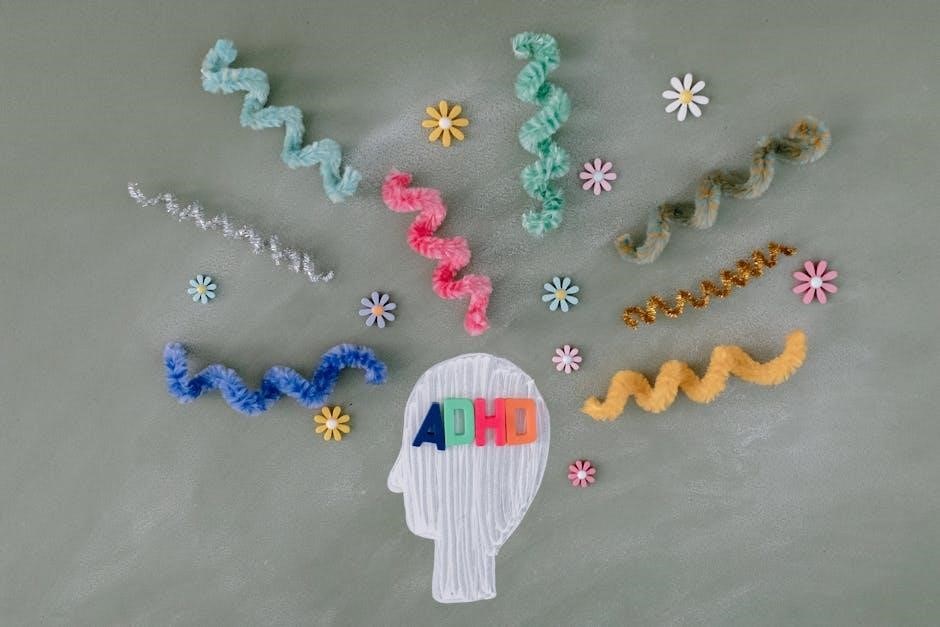Psychological development explores the lifespan changes in behavior, emotions, and cognition, shaping individual growth and societal progress through understanding human adaptation and mental processes effectively.
1.1 Definition and Scope
Psychological development refers to the systematic study of changes in human behavior, cognition, and emotions across the lifespan. It encompasses the biological, social, and environmental factors influencing growth from infancy to adulthood. This field examines how individuals adapt, learn, and interact with their surroundings, shaping their identity and capabilities. The scope includes understanding cognitive milestones, emotional regulation, and social dynamics, providing insights into human adaptation and development. It serves as a foundation for addressing developmental challenges and enhancing well-being through targeted interventions and support systems.
1.2 Importance of Studying Psychological Development
Studying psychological development is crucial for understanding human behavior, cognition, and emotional growth across the lifespan. It provides insights into how individuals adapt to challenges, form relationships, and develop morally. By exploring these processes, researchers and practitioners can design effective interventions, educational strategies, and policies that promote healthy development. This knowledge also aids in addressing mental health issues, improving parenting techniques, and fostering societal well-being. Ultimately, understanding psychological development empowers individuals and communities to support optimal growth and resilience across all life stages.
1.3 Overview of Key Theories
Psychological development is guided by several influential theories, including Piaget’s cognitive theory, which focuses on stages of thinking, and Vygotsky’s sociocultural approach, emphasizing social interaction. Kohlberg’s moral development theory explores ethical reasoning, while Bowlby’s attachment theory highlights early relationships. These frameworks, along with others like Freud’s psychodynamic theory, provide foundational insights into how individuals grow and adapt across the lifespan, shaping behavior, cognition, and emotional well-being.

Theoretical Foundations of Psychological Development
Psychological development is rooted in diverse theories that explain human growth, guiding research and practice by providing frameworks to understand cognitive, emotional, and social progression across the lifespan.
2.1 Freud’s Psychosexual Theory
Sigmund Freud’s psychosexual theory proposes that personality development occurs through a series of five stages, each focusing on pleasure-seeking behaviors associated with specific body parts. The stages—oral, anal, phallic, latency, and genital—shape the id, ego, and superego. Fixations or conflicts during these stages can lead to psychological issues. Freud emphasized the Oedipus complex in the phallic stage, where children experience desire for the opposite-sex parent. While influential, the theory has faced criticism for its lack of empirical support and focus on sexuality. It remains a foundational concept in understanding psychological development.
2.2 Erikson’s Psychosocial Theory
Erikson’s Psychosocial Theory proposes eight stages of development, each with a unique conflict shaping identity. From trust vs. mistrust in infancy to integrity vs. despair in old age, Erikson emphasized social interactions and cultural influences in fostering healthy ego development. Each stage builds on the previous, guiding individuals toward a sense of purpose and belonging. Erikson’s theory highlights the lifelong process of psychosocial growth, stressing the importance of resolving conflicts to achieve emotional and social well-being across the lifespan.
2.3 Piaget’s Cognitive-Developmental Theory
Jean Piaget’s theory proposes that cognitive development occurs through four stages: sensorimotor, preoperational, concrete operational, and formal operational. Each stage builds on the previous one, enabling increasingly complex thinking. Piaget emphasized active learning, where children construct knowledge by interacting with their environment. Key concepts include assimilation (fitting new info into existing schemas) and accommodation (adjusting schemas to fit new info). Equilibration drives development as children balance assimilation and accommodation to achieve cognitive equilibrium. Piaget’s theory highlights the importance of understanding and supporting children’s natural learning processes, emphasizing readiness for new concepts at each stage.
2.4 Vygotsky’s Sociocultural Theory
Lev Vygotsky’s Sociocultural Theory emphasizes the role of social interactions and culture in shaping cognitive development. He proposed that children learn through collaborative dialogues with more knowledgeable others (MKOs), fostering their understanding within the Zone of Proximal Development (ZPD). Vygotsky stressed that cultural tools, such as language and symbols, mediate thinking and guide development. He believed that learning is a socially constructed process, where individuals internalize knowledge through shared experiences. This theory highlights the importance of social context and collaboration in fostering intellectual and psychological growth across the lifespan.
2.5 Kohlberg’s Moral Development Theory
Stages of Cognitive Development
Cognitive development progresses through structured stages, as proposed by Jean Piaget, reflecting growth in problem-solving, reasoning, and understanding from infancy through adulthood.
3.1 Sensorimotor Stage (Infancy)
The sensorimotor stage, spanning birth to approximately 2 years, is the first phase of cognitive development. During this period, infants learn by using their senses and motor activities to interact with the environment. They progress from reflexive actions to deliberate movements, developing object permanence, the understanding that objects continue to exist even when out of sight. This stage is marked by trial-and-error learning, imitation, and the emergence of basic problem-solving skills, laying the foundation for future cognitive and motor abilities.
- Infants develop through sensory experiences and motor interactions.
- Object permanence is a key milestone achieved during this stage.
- Learning occurs through trial and error, imitation, and exploration.
- It establishes the groundwork for cognitive development in later stages.
3.2 Preoperational Stage (Early Childhood)
The preoperational stage, spanning early childhood (2–7 years), is marked by egocentric thinking and a lack of logical operations. Children struggle with conservation tasks and exhibit centration, focusing on one detail while ignoring others. Language development flourishes, enabling symbolic thinking and pretend play. However, their perspective-taking remains limited, and they often display animistic beliefs. This stage lays the groundwork for social and cognitive advancements, as children begin to engage in cooperative play and demonstrate an understanding of cause-effect relationships, albeit not yet logically consistent.
3.3 Concrete Operational Stage (Middle Childhood)
During the concrete operational stage, children (ages 7–11) develop logical thinking about concrete events. They understand conservation, reversibility, and classification. Problem-solving improves as they apply logical rules to tangible situations. Egocentrism decreases, allowing for better perspective-taking. This stage marks the ability to think logically about physical events and understand cause-and-effect relationships. However, thinking remains tied to concrete reality, limiting abstract reasoning. Piaget viewed this stage as a critical step toward formal operational thinking, emphasizing the mastery of logical operations in real-world contexts.
3.4 Formal Operational Stage (Adolescence and Beyond)
The formal operational stage, as proposed by Jean Piaget, begins in adolescence and continues into adulthood. During this stage, individuals develop the ability to think abstractly, reason logically, and consider hypothetical situations. They can engage in deductive reasoning and think about abstract concepts, such as justice, morality, and philosophical ideas. This stage is characterized by the development of mental operations that allow for systematic problem-solving and the ability to think about abstract principles. It marks the culmination of cognitive development, enabling individuals to reason logically and engage in abstract thought effectively.

Social and Emotional Development
Social and emotional development involves acquiring skills to navigate relationships, manage emotions, and adapt to societal expectations, shaped by interactions and experiences across life stages and environments.
4.1 Erikson’s Eight Stages of Psychosocial Development
Erikson’s theory proposes eight stages of psychosocial development, each marked by a unique crisis or conflict. From trust vs. mistrust in infancy to integrity vs. despair in old age, these stages outline how individuals develop socially and emotionally. Each stage builds on the previous one, shaping identity, purpose, and a sense of belonging. Erikson emphasized the role of social interactions and cultural influences in fostering healthy development across the lifespan, providing a holistic view of human growth and adaptation.
4.2 Attachment Theory and Its Impact
Attachment Theory, introduced by Bowlby and Ainsworth, emphasizes the critical role of early relationships in shaping emotional and social development. It identifies attachment styles—secure, anxious, avoidant, and disorganized-disoriented—that influence trust, emotional regulation, and interpersonal skills. Securely attached individuals generally exhibit resilience and healthy relationship patterns, while insecure attachments may lead to emotional difficulties. Understanding attachment dynamics is vital for fostering supportive caregiving environments, improving parenting practices, and informing therapeutic interventions to promote mental health and well-being across the lifespan.
4.3 Emotional Intelligence and Regulation
Emotional intelligence refers to the ability to recognize, understand, and manage one’s emotions and those of others. It involves empathy, self-awareness, and effective communication. Emotional regulation is the process of controlling emotional responses to stressful or challenging situations. Developing these skills enhances interpersonal relationships, mental health, and overall well-being. Strategies like mindfulness, cognitive reframing, and emotional labeling can improve regulation. Higher emotional intelligence is linked to better decision-making, conflict resolution, and resilience. Cultivating these abilities from an early age fosters healthier emotional and social development across the lifespan, benefiting both personal and professional contexts.
4.4 Peer Relationships and Social Learning
Peer relationships significantly influence psychological development, fostering social skills, emotional regulation, and cognitive growth. Social learning theory, developed by Albert Bandura, emphasizes observation and imitation as key mechanisms for acquiring behaviors and values. Positive peer interactions enhance empathy, cooperation, and self-esteem, while negative interactions may lead to aggression or social withdrawal. Peer groups provide support and a sense of belonging, particularly during adolescence when identity formation is critical. These relationships also shape cultural norms and values, highlighting their profound impact on lifelong development and societal integration.
Moral Development Across the Lifespan
Moral development examines the evolution of ethical reasoning, emotions, and behaviors across the lifespan, influenced by cognition, culture, and social interactions shaping moral values and judgments effectively.
5.1 Preconventional Morality
Preconventional morality, the first stage in Kohlberg’s theory, is characterized by a focus on obedience, rewards, and punishments. Individuals at this stage prioritize avoiding punishment over understanding moral principles. Decisions are based on external consequences rather than internal ethical reasoning. This stage is typical in early childhood, where children’s moral understanding is shaped by direct outcomes, such as receiving rewards for good behavior or facing punishment for misbehavior. It lays the groundwork for more advanced moral reasoning but remains egocentric, lacking a broader societal perspective or ethical consideration.
5.2 Conventional Morality
Conventional morality focuses on adhering to societal norms, rules, and expectations to maintain social order and gain approval. At this stage, individuals prioritize loyalty, duty, and respect for authority. Behavior is guided by the desire to fit into society and avoid punishment, rather than internal principles. This stage emphasizes the importance of law, social roles, and collective expectations in shaping moral judgment. It reflects a shift from personal whims to societal standards, highlighting the role of external validation in moral decision-making.
5.3 Postconventional Morality
Postconventional morality, the highest stage in Kohlberg’s theory, involves individuals applying internal principles of justice and morality rather than adhering to societal norms. At this stage, decisions are guided by universal ethical values, such as human rights and fairness, rather than fear of punishment or desire for reward. Individuals prioritize justice over laws, showing a deep understanding of morality as a personal and ethical system. This stage is rare, emerging in late adolescence or adulthood, and reflects a high level of moral reasoning and independence from external expectations.
5.4 Cultural Variations in Moral Development
Cultural differences significantly influence moral development, with collectivist societies often prioritizing group harmony over individual rights, while individualist cultures emphasize personal freedom and autonomy. Practices like filial piety in Asian cultures and honor-based systems in Middle Eastern societies highlight diverse moral frameworks. Emotional expression and moral reasoning also vary, as some cultures value emotional restraint, while others encourage open expression. These variations underscore the role of cultural norms in shaping moral values, behaviors, and decision-making processes across the lifespan, reflecting both universal and culture-specific aspects of moral development.
Language and Psychological Development
Language plays a pivotal role in psychological development, influencing cognition, communication, and identity formation, while shaping thought processes and social interactions across the lifespan effectively.
6.1 Language Acquisition Theories
Language acquisition theories explain how humans develop language skills. Skinner’s behavioral theory suggests learning through reinforcement and environment. Chomsky’s nativist theory proposes an innate universal grammar. The interactionist approach combines nature and nurture, emphasizing social interaction’s role. These theories provide frameworks for understanding how children acquire language, highlighting the interplay of biology, environment, and culture. Each theory offers unique insights, helping to explain the complex process of language development across the lifespan.
6.2 Role of Language in Cognitive Development
Language plays a pivotal role in cognitive development by enabling thought organization, memory enhancement, and problem-solving abilities. It serves as a medium for expressing ideas, facilitating learning, and constructing mental representations. Through language, individuals develop abstract thinking and conceptual understanding, essential for academic and social success. Moreover, language influences perception, as words and concepts shape how we interpret the world. Cognitive development is deeply intertwined with linguistic skills, as they collectively foster intellectual growth and adaptive behaviors across the lifespan.
6.3 Bilingualism and Its Effects
Bilingualism significantly influences psychological development, enhancing cognitive flexibility, memory, and problem-solving skills. It delays language development initially but fosters stronger executive function and metalinguistic awareness. Bilingual individuals often exhibit improved multitasking abilities and delayed onset of age-related cognitive decline. Social-emotionally, bilingualism enriches cultural understanding and empathy, promoting adaptability in diverse environments. However, it can also lead to language conflicts and identity challenges. Overall, bilingualism is a valuable asset, offering lifelong cognitive, social, and cultural benefits that enrich psychological growth and adaptation.

Factors Influencing Psychological Development
Biological, environmental, and sociocultural factors significantly shape psychological development, influencing behavior, cognition, and emotional growth across the lifespan through complex interactions and individual differences uniquely.
7.1 Biological Factors (Genetics, Brain Development)
Biological factors, including genetics and brain development, significantly influence psychological development. Genetics determine innate traits and predispositions, while brain maturation shapes cognitive and emotional processes. Key brain structures like the cerebral cortex and limbic system regulate thought, memory, and emotions; Neuroplasticity allows the brain to adapt and reorganize, enhancing learning and recovery. Hormonal changes, particularly during puberty and aging, also impact psychological states. Understanding these biological mechanisms provides insights into individual differences and developmental milestones, emphasizing the interplay between nature and nurture in shaping human behavior and mental health across the lifespan.
7.2 Environmental Factors (Family, Culture, Socioeconomic Status)
Environmental factors significantly influence psychological development, with family dynamics shaping early attachment and social skills. Cultural norms and values guide behavior and beliefs, while socioeconomic status impacts access to resources, education, and opportunities. Families provide emotional support and role models, fostering resilience or vulnerability. Cultural practices, such as education and childcare, vary widely, affecting cognitive and social development. Socioeconomic status often correlates with environmental enrichment, influencing long-term outcomes. These factors interact, creating unique developmental pathways that highlight the complexity of human growth within diverse contexts.
7.3 Sociocultural Factors (Norms, Values, Education)
Sociocultural factors, including norms, values, and education, significantly influence psychological development. Cultural norms shape behavior, while values guide moral reasoning and identity formation. Education systems foster cognitive growth, socialization, and skill development, acting as a bridge between individual potential and societal expectations. Additionally, cultural practices and beliefs impact learning styles, problem-solving approaches, and interpersonal interactions. These factors interact with biological and environmental influences, creating a dynamic interplay that guides development across the lifespan, emphasizing the importance of understanding diverse sociocultural contexts in fostering holistic growth and well-being.
- Cultural norms and values shape behavior and identity.
- Education systems influence cognitive and social development.
- Sociocultural contexts impact learning styles and interactions.

Special Topics in Psychological Development
This section covers unique aspects of psychological development, including resilience and coping strategies, the impact of trauma, and the implications of giftedness and special educational needs.
8.1 Resilience and Coping Mechanisms
Resilience refers to the ability to adapt and recover from adversity, while coping mechanisms are strategies used to manage stress and challenging situations. Developing resilience enables individuals to navigate life’s difficulties effectively, fostering emotional well-being and personal growth. Positive relationships, problem-solving skills, and a growth mindset enhance resilience. Coping mechanisms, such as emotional regulation and seeking social support, play a crucial role in maintaining mental health. Understanding these concepts is essential for promoting psychological development and helping individuals thrive in the face of adversity throughout their lives.
8.2 Impact of Trauma and Stress
Trauma and stress significantly influence psychological development, often leading to long-term emotional and cognitive challenges. Early exposure can disrupt brain development, affecting emotional regulation and mental health. Children may experience anxiety, depression, or PTSD, while adults might struggle with relationships or decision-making. Chronic stress impairs cognitive functioning and resilience. The impact varies based on age, severity, and support systems. Understanding these effects is crucial for developing interventions to mitigate harm and promote recovery, ensuring healthier psychological outcomes across the lifespan.
8.3 Giftedness and Special Needs
Giftedness and special needs are critical aspects of psychological development, involving unique cognitive, emotional, and social challenges. Gifted individuals often exhibit exceptional abilities in specific domains, such as mathematics or creativity, requiring tailored educational and psychological support. Special needs encompass a range of conditions, including learning disabilities, autism, and physical impairments, which demand adaptive strategies to ensure inclusive growth. Psychological development theories emphasize the importance of identifying and addressing these differences early to provide appropriate interventions and foster optimal potential. Understanding these aspects ensures equitable opportunities for all individuals to thrive, regardless of their abilities or challenges.
Psychological Development Across the Lifespan
Psychological development is a continuous journey, encompassing cognitive, social, and emotional growth from infancy through adulthood and aging, shaping individual adaptation and identity formation across life stages effectively.
9.1 Infancy and Toddlerhood
Infancy and toddlerhood mark the foundation of psychological development, characterized by rapid growth in sensorimotor skills, emotional bonding, and early language acquisition. Infants begin to understand their environment through sensory experiences and motor activities, while trust formation is crucial during this stage. Toddlers explore independence, developing basic problem-solving abilities and imitating social behaviors. Language emerges, and emotional regulation starts to take shape. These early years are critical for setting the stage for future cognitive, social, and emotional development, influenced by caregiving quality and environmental interactions.
9.2 Early Childhood
Early childhood, spanning ages 3 to 6, is marked by rapid cognitive, social, and emotional growth. Language skills flourish, and imaginative play becomes a cornerstone of development. Motor abilities refine, enabling greater independence. Social interactions deepen, fostering empathy and cooperation. Emotional regulation improves, though tantrums may still occur. Curiosity and exploration drive learning, with a growing understanding of causality. Parental guidance and attachment play a critical role in shaping self-esteem and resilience. This stage lays the foundation for future academic and social success, making it a pivotal period for interventions and supportive environments.
9.3 Adolescence
Adolescence is a critical transitional phase marked by significant physical, emotional, and cognitive changes. It begins with puberty, triggering bodily transformations and identity exploration. Emotional fluctuations and social pressures intensify as individuals seek independence and peer validation. Cognitive development advances, enabling abstract thinking and moral reasoning. Identity formation, as per Erikson, involves exploring roles and values. Challenges like balancing autonomy with guidance, navigating societal expectations, and managing self-esteem arise. Positive experiences during adolescence lay the groundwork for healthy adult functioning, while adverse ones may lead to long-term emotional or behavioral difficulties. Sociocultural influences further shape this dynamic life stage.
9.4 Adulthood and Aging
Adulthood and aging are critical phases in psychological development, characterized by continued growth and adaptation. Middle adulthood often involves establishing a sense of purpose and fulfillment, while late adulthood focuses on reflection and legacy-building. Cognitive changes, such as slower processing speeds, are balanced by gains in wisdom and emotional intelligence. Social roles expand, with many individuals mentoring younger generations. Emotional resilience strengthens, enabling better coping with life’s challenges. Despite physical decline and potential loss, aging individuals often find meaning in their contributions to society, highlighting the enduring potential for psychological growth and well-being.
Psychological development offers profound insights into human growth, emphasizing the role of theories, stages, and influencing factors in shaping behavior, cognition, and emotional well-being across the lifespan effectively.
10.1 Summary of Key Concepts
Psychological development encompasses the study of human growth across the lifespan, focusing on cognitive, social, and emotional changes. Key theories, such as Freud’s psychosexual stages, Erikson’s psychosocial development, Piaget’s cognitive stages, and Vygotsky’s sociocultural approach, provide frameworks for understanding growth. Moral development, as per Kohlberg, highlights ethical reasoning progression. Factors like biology, environment, and culture shape developmental trajectories. Resilience, trauma, and special needs further influence outcomes. Understanding these concepts aids in fostering healthy development, informing education and parenting strategies, and promoting societal well-being across all life stages.

10.2 Implications for Education and Parenting
Understanding psychological development is crucial for educators and parents to create supportive environments that foster healthy growth. Tailored educational strategies can enhance cognitive and emotional development, ensuring students thrive academically and socially. Parents benefit from insights into developmental milestones, enabling them to provide appropriate guidance and nurturing. By aligning practices with developmental theories, both educators and caregivers can address individual needs, promote resilience, and cultivate lifelong learning skills, ultimately shaping well-rounded individuals capable of navigating life’s challenges effectively and contributing positively to society.
10.3 Future Directions in Psychological Development Research
Future research in psychological development should focus on integrating neuroscience, technology, and cultural diversity to address gaps in understanding lifespan changes. Longitudinal studies could provide deeper insights into developmental trajectories, while exploring interventions to enhance resilience and cognitive growth. Incorporating digital tools for data collection and analysis will enable more precise measurements. Additionally, examining the interplay between biological and environmental factors, such as epigenetics and socioeconomic status, could revolutionize the field. Collaborative efforts across disciplines will foster innovative solutions to complex developmental challenges.

References
The references below provide foundational and contemporary insights into psychological development. Freud, S. (1923). The Ego and the Id. London: Hogarth Press. Erikson, E. (1950). Childhood and Society. New York: Norton. Piaget, J. (1954). The Construction of Reality in the Child. New York: Basic Books. Vygotsky, L. (1978). Mind in Society. Cambridge: Harvard University Press. Kohlberg, L. (1963). The Development of Children’s Orientations Toward a Moral Order. Vita Humana, 6(1-2), 11-36. These works, alongside recent studies, form the backbone of psychological development research.
